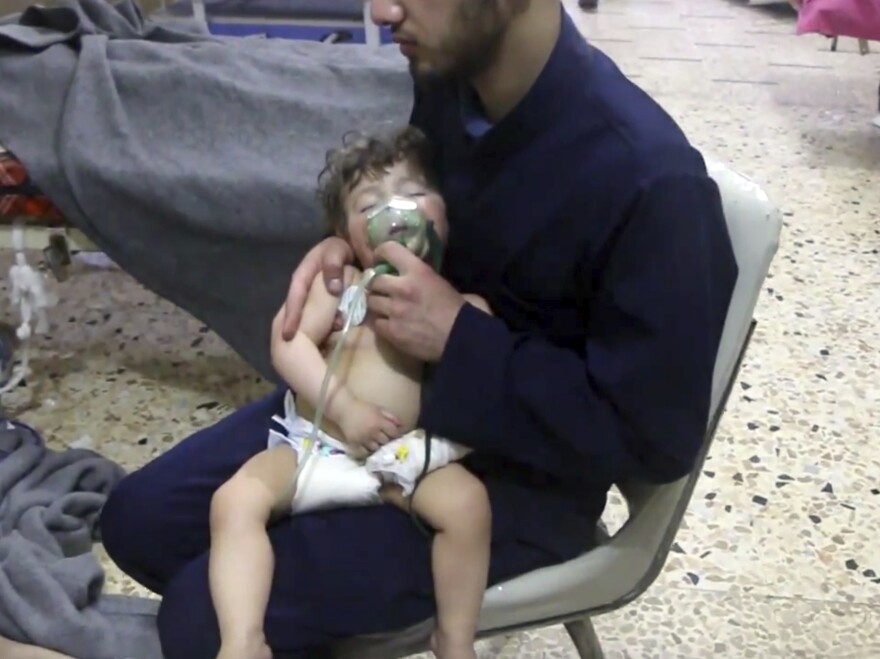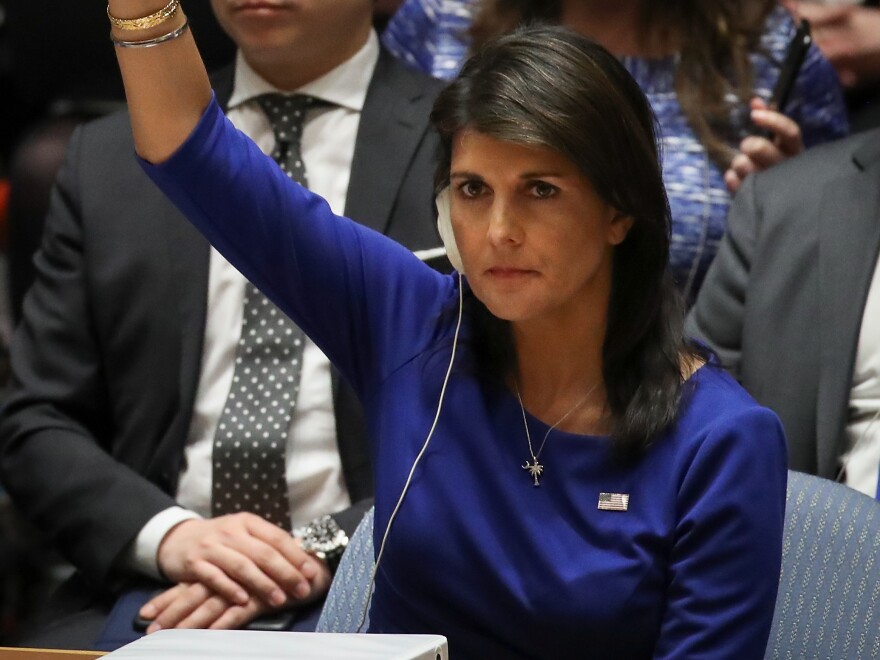Updated at 2:01 p.m. ET
More than 100 missiles were launched early Saturday morning by the U.S. and its allies France and the U.K., targeting three chemical weapons sites in Syria. The mission, according to Pentagon officials, has "significantly crippled" Syrian President Bashar Assad's ability to manufacture chemical weapons. No casualties have been reported.
The three sites targeted were "fundamental components" to Syria's chemical weapons program, according to Marine Lt. Gen. Kenneth McKenzie.
The first of the targets was a research center near the capital city of Damascus; 76 missiles were launched against the center. McKenzie says the strike will set Syria's chemical program back for years.
In addition, a storage facility was the target of 22 weapons launched by all coalition forces, and a bunker facility was the target of seven Scout missiles. Both facilities are located near Homs, north of Damascus.
The Pentagon says Syria launched 40 surface-to-air missiles in response to the coalition attack. McKenzie says the missiles were fired after the "last impact" was over.
According to chief Pentagon spokeswoman Dana White, the locations of the precision strikes were "carefully orchestrated" to minimize collateral damage but to prevent future use and production of chemical weapons. The use of which, she says, "is inexcusable" and "illegal."

The Syrian government is accused of launching a chemical attack in Douma last week. The attack reportedly occurred in the Ghouta region and killed dozens, including women and children. Until recently, the town was the last rebel stronghold in the area. Pictures from opposition supporters circulated on social media showing lifeless bodies piled in basements.
Syria says it had given up its chemical weapons in 2013. In 2017, the U.S. launched missiles against Syria following reports of a sarin gas attack. That attack, White says, hit a Syrian military air base and was intended to focus on Syria's ability to deliver chemical weapons. But last night's attack was aimed at the "heart of enterprise," the Pentagon said.
Though the Pentagon is "still assessing" the use of a nerve agent, officials would not elaborate on their process or evidence, but are confident in the decision to conduct airstrikes.
Syria and its ally Russia deny any such attack, calling it "fabricated."
After the U.S. attack, Syria state TV appeared to show a country back at work — broadcasting footage of Assad returning to his office in a suit, briefcase in hand. Syrians were also shown gathering in central squares in Aleppo waving Syrian flags and saying that they would never kneel to foreign enemies.
In Syria, the airstrikes are being called a terrorist attack. State TV broadcast what it said was the research center that was attacked, showing footage of rubble and destroyed building.
Despite the airstrikes, White maintains that the U.S. has no interest in engaging with the Syrian civil war and that the main objective of U.S. forces in Syria remains to "defeat ISIS."
President Trump took to Twitter early Saturday morning, "Mission Accomplished!" he wrote.
White agreed with the president, adding that "what happens next depends on what the Assad regime decides to do, and what the Russian government decides to enable."
Russia calls emergency U.N. Security Council
The United Nations Security Council met Saturday and rejected a Russian resolution condemning the U.S. and its allies for the attacks. Russia, China and Bolivia voted in favor of the resolution, four countries abstained.

The Russian ambassador to the U.N., Vasily Nebenzia, called the attacks "hooliganism in international relations" and is accusing the U.S. and its allies of acting before international inspectors have concluded their investigation.
That sends a clear message, according the Syrian representative to the U.N., that there is no interest in a "transparent investigation." Speaking through a translator, Bashar Jaafari blamed rebel groups in the Ghouta region for fabricating a chemical attack.
Nikki Haley, the U.S. ambassador to the U.N., doubled down on the U.S. strategy in Syria, saying that nothing has changed and that if Assad uses poison gas again, the United States is "locked and loaded."
Copyright 2021 NPR. To see more, visit https://www.npr.org. 9(MDAxODg3MTg0MDEyMTg2NTY3OTI5YTI3ZA004))


